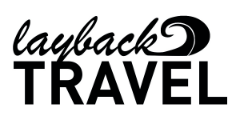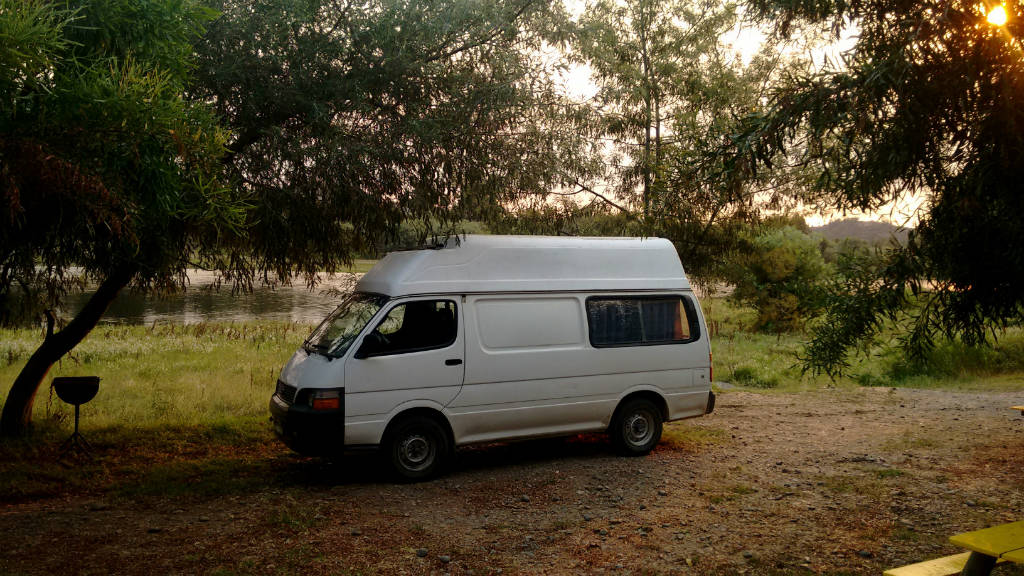The best way to explore Chile, Patagonia or South America is with your own car or van. A camping vehicle gives you so much freedom - you can go anywhere, stop anytime and not be dependent on bus schedules or accommodation. If you see an amazing view at the side of the road - you can just stop and take it all in. Sitting in a Bus you would just rush past it. Chile is know, as the best country in South America for foreigners to buy a vehicle. In this article we explain step by step how to buy a car or vehicle in Chile.
Get a RUT number
A RUT number is a government identity number for Chile. It's a social security/tax number. This number is very important - without it you can't buy a car.You get the RUT number at any Servicio de Impuestos Internos (SII) office. Line up at the information desk, tell the person you want to apply for a RUT and you will get the form F4415.1. To fill out the form you need your passport and an address in that district. We asked the people from our hostel if we could use their address.
We read many blog articles like "Practicing for Retirement" or "Freckled and Footloose" that stated we needed a Chilean sponsor to get a RUT number. When we applied for a RUT number at the SII office in Vina del Mar we didn't need a sponsor. Our guess is, that you only need a sponsor when you apply for your RUT in Santiago.
After 20 Minutes at the SII office we had our RUT. The SII offices in Chile closes around 2pm - make sure to arrive early as it can get very busy later in the day. The RUT is just a piece of paper with 9 digits on it. Make a copy of it, to be safe and get the original laminated. It looks more official that way.
Bonus: With a RUT you can save money. For example: At the Torres del Paine Nationalpark you pay the local entrance fee of 6'000 CLP instead of the entrance fee for tourist which is 21'000 CLP. Furthermore you get a cheaper price at the Ferry Transbordadora Austral. Just always ask if you can pay the local price if you have a RUT - we were surprised how often this works.
Find a car or van
This is the tricky part - finding the perfect car for you. There is one main question every overlander asks himself. Do I want a 4x4 - to not be limited by road conditions but lack space? Or do I want a van with more comfort and space but lack the freedom to drive off-road excessively? There is no perfect answer - you have to know for yourself what feels right.Hint: We went with a van as its more comfort for a longer period of time and as surfers we also accessed some really remote places with no struggle.
We decided to look for cars away from Santiago. Santiago has a bigger car market but its also more hectic and competitive in the city. As surfers we sought the ocean and wanted to stay close the surf breaks. The area around Con Con / Vina del Mar was ideal for us to look for a car.
To find out perfect campervan we looked on international sites such as:
www.drivetheamericas.com/forums/vehicles-salewanted
http://panamericanaforum.org/
www.facebook.com/groups/panamtravelers/
www.facebook.com/groups/overlandingbuysell/
And on the local sites like:
www.yapo.cl & www.chileautos.cl
On the international websites we dealt with other travelers and communicated in English over email and/or Facebook. Most vehicle on these international forums are equipped for camping and overlanding - so exactly what you need. However we found this international market to be more expensive than the local market. Especially in high season, December to February, some really crappy vehicles are being sold for ridiculous prices.
On the local sites, there is an abundance of vehicles but few are equipped for camping. But its definitely cheaper. We contacted the sellers at first over WhatsApp in Spanish and then maybe called them to set up a meeting. If you don't speak Spanish - just give it a go. Use Google Translator to help you out. Don't be shy. If you travel in South America you need to learn Spanish sooner or later. It just makes life so much easier.
After you found the car or van you like, check it out by a mechanic. Ask at your hostel If they know a trustful mechanic or look on the ioverlander app. Many travelers use this app when they travel around South America. Furthermore check if the necessary documents (see next step) are correct and registered in the sellers name and if there are any outstanding fines.
In the end we found our van - a Toyota HiAce 1999 with high roof on yapo.cl. The van was an old ambulance and was completely empty. We built the interior by ourselves with the help of a local carpenter. More details on this in another article.
Buy the vehicle - Notario and ownership transfer
The seller and you have to go to a Notario. He might insist that you do all the paperwork at the Registro Civil, like all chileans do it. However this is not possible for you - as a foreigner and new owner of a RUT you are not in the system yet.
Go to the a notario and the seller has to bring the following documents:
- Padron (Certificate of Ownership)
- Certificado de Revision Technica (Safety Certificate – issued yearly)
- Permiso de Circulation (Road tax – issued yearly and must be renewed in March)
- Segurado Obligatorio (Compulsory Insurance – issued yearly and must be renewed in March).
- Certificate de Anotaciones (has to be issued on the date you're going to the notario or they will not accept it - it shows the correct registration of the vehicle)
- Certificado de Multas (displays any outstanding fines on the car – also has to be issued on the date you’re going to the notario)
You need to bring:
- Passport, RUT and local address (best use the same one as the RUT)
- Cash to pay for Notario costs, vehicle taxes and transfer of papers
The Notario people will set up the contract ( Compraventa ), which you both will sign and put your fingerprints on it. Then you need to pay the sales taxes on your vehicle. You can either take the sales prices or the value of the car. In our case the value of the car was lower so we decided to pay taxes on this - saved us money. Our van cost 3million and we payed - 27’000 CLP tax.
You will be given a piece of paper with the tax amount you have to pay. These can be paid at any bank. However banks in Chile close at 2PM so be sure to start the buying process early in the morning. Only when the taxes are payed the Notario will give you the sales contract and everything is legit.
Once you payed the Notario for his services ( total we payed about 40’000 CLP), the Notario will send the contract to the Registro civil and they will change the Pardon (Certificate of Ownership) to your name. This will take about 2 to 4 weeks! Bummer - yes we know. The original Padron will be sent to the address you provided in the contract. But you don't have to go back to your local address to collect the Padron - you can get a copy of it at ANY Registro Civil in Chile! However you still have to wait for the original Padron to get sent out. The Padron original or copy will just be a piece of paper - get it laminated. Just like your RUT it's a very important piece of paper.
Till you get your Padron - you can drive around in Chile just with the sales contract. However if you want to leave the country - get an authorization from the seller. While you're in the Notario, tell them to set up an authorization that you can leave the country with the seller's permission. This is a common documents for travelers to have and the Notario should be able to set it up in no-time.
Congratulations you just bought a vehicle in Chile and are ready to travel!
Additional document to leave Chile - Declaraion Jurada
When we bought our van in January 2017 we were reading about some incidents at the borders that travelers with vehicles with Chilean license plates couldn't leave the country. The reason was that they didn't have a residency or working permit in Chile. However other travelers were able to leave Chile and it really depends on the border and the custom officer on duty.This law came up in August 2016 and was slowly being enforced - the reason for this law was that people from Argentina, Peru and Bolivia were buying cars in Chile and driving off to their country and never coming back and this deprived the Chilean market of much needed vehicles. Hence this new law.
Nevertheless we didn't want to depend on the randomness of some custom officers and plead with them to let us travel the way we want to. It just not our style. So we went to the Custom Office (Aduana) in Puerto Montt and talked to them. And we found a solution.
The solution seems to be Law Article 17.2.3. Here is the link.
It states, that as a foreigner without residence you need a "declarion jurada" that's says you will return to Chile with the vehicle. In order to get this document at the Notario you needed to show the "Certificado Anotaciones Vigentes" of our van (go to a internet café and they can print it our for you). Check the Facebook post below for an example what text the declaration should include. The Notario gave us two declaracion juradas, but we still made copies to be on the save side. The aduana people in Puerto Montt told us that we need to leave one original at the first border we cross. However after several border crossing into Argentina we were never asked to leave a document at a crossing.
This solution has worked for us several times at small or big border crossing. Often the custom officer didn't want to let us trough because we didn't have a residency or working permit in Chile. The reality is that most custom officers are not fully aware of the law they need to enforce - call it incompetence or misinformed. But just remain cool and patient. We always had actual law text ready to show it to the custom officers and tried to politely educate them. And then it always worked - ALWAYS! Don't take a NO from the custom office but be confident, respectful but persistent. This is the law and it does work, even if some ill informed people on various travel forums say otherwise.
We shared this solution in the PanAmericana Travelers Association on Facebook. It has been discussed a great length there and helped many travelers. Check it out.
Solution for Foreigners with Chilean Car to leave the country.We went to the Aduana in Puerto Montt today to see how...
Posted by Gabriel Wappler on Monday, March 6, 2017


Easiest way to buy a camper van in Chile - Suzi Santiago
[…] Travelling along the Pan-American Highway or exploring Patagonia with a car, bike or camper van has become a popular overlanding adventure. Chile is known as the best country for foreigners to buy a vehicle in South America. However the process of obtaining the necessary documents and finding a vehicle can be very time consuming and stressful. We have experienced this nerve-racking process first hand. […]